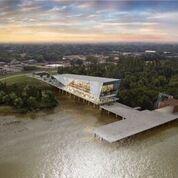With a University connection, cutting-edge research and financial pursuits underway, the Baton Rouge Area Chamber doesn’t think it will be hard to recruit businesses to set up shop on its waterfront property which houses a collaborative research development and business park.
Sprawling across 35 acres, the Water Campus, which is still under construction, focuses its efforts on the water economy. In addition to fostering innovation, the campus will conduct research and execute projects dedicated to coastal restoration and sustainability.
While the development seeks to apply a “campus-like setting” to lure in companies and intellectual capital, Kyle Zeringue, BRAC senior vice president of business development, said the main goal of the park is to identify innovative solutions to the “complex water challenges” facing the state.
“Now that we have buildings to show companies and we have renderings to show what the campus will look like, there’s more and more interest from large engineering firms, large construction firms and other types of technology companies that want to utilize that space to attract top talent,” Zeringue said.
According to its website, the $50 million-plus Water Campus’ first tenants include The Water Institute of the Gulf, the Louisiana Coastal Protection and Restoration Authority and the LSU River Modeling Center. Though still under construction, Zeringue said tenants will move into the CPRA building during the summer, and the River Modeling Center should be occupied by the end of the year.
University engineering professor and director of the LSU River Modeling Center Clint Willson said the Center will have three main focuses: experimenting with management strategies for the lower Mississippi River, reaching out to the local community through an exhibition and offering hands-on experience with a hydraulics lab.
“I think it’s a win-win because LSU gets the visibility and opportunity to interact more closely with people from the CPRA and the Water Institute, and I think they also benefit from being in close proximity to LSU students, faculty and staff,” Willson said.
The Water Institute of the Gulf building, which Zeringue called the “showpiece of the entire development,” will begin construction sometime in late spring or early summer. He said the building will have a modern design and overlook the Mississippi River.
BRAC’s ultimate objective is to expand beyond the initial three occupants and encourage others to join in the economic opportunity. In an urban environment like Baton Rouge, Zeringue said possibilities for the park’s efforts range from sewage treatment to disaster management.
To ensure development continues running smoothly, he said BRAC must align stakeholders and educate companies on the value of investing in the engineering, biology and computer science the Water Campus would offer. Fundamentally, he said the primary recruitment strategy BRAC employs is “an education process,” convincing potential investors of the campus’ direct connectivity to the University and to the downtown area.
For companies with water practices and water focuses, Zeringue said the campus is the perfect place for business, as the workforce draws from LSU, Southern University and other collegiate institutions in the state. He said total employment could exceed 4,000 people.
“We’re creating opportunity for students to stay in Louisiana and Baton Rouge to ultimately work at a state-of-the-art, first class development right on the water in downtown Baton Rouge,” he said.
Water Campus plans to focus efforts on coastal economy
March 8, 2016





